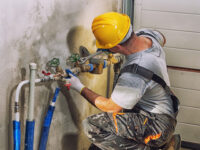How to Get Certified for a Home Inspection
If you consider buying a home, you might consider getting a Home Inspection. However, it would help if you considered a few factors before hiring a professional. For one, the home inspector you hire should be certified and must have undergone Home Inspection Training. Second, a reputable home inspector will know how to get the job done without costing you an arm and a leg. Finally, you should ask for a sample report from a previous client to see if any issues have popped up.

A home inspector can only see the visible parts of a house, which may be hidden beneath the surface. He can’t check underground or behind moving boxes, but he can check the foundation and crawl space. However, if the home is vacant, the inspector can’t check these areas either. If you’re concerned about a home’s condition, you should hire an inspector if you want to be sure it’s safe for you to live in it.
You can get certified by taking an online course with a reputable school. Some online programs offer supplemental tutorials that reinforce the concepts covered in the course. Some even offer unlimited instructor support. While this program is online, the price is reasonable. And, the program also comes with a marketing and operational manual. If you’re looking for an online home inspection course, you can find it at ATI Training. This website also has discount rates for professionals.
Lastly, a good home inspector will be able to point out things you may not otherwise notice. Aside from the obvious structural and safety issues, they may also notice unseen hazards. For example, they may notice a stain on the ceiling indicating water damage. In addition, they may be able to detect hidden pests. The inspection might not even catch them. Some inspectors even don’t check for hidden areas that require specialized evaluations.
You can become a certified home inspector through a training program. In some cases, it takes just a few days. However, it is important to choose an accredited course that provides hands-on training and a lifetime of access to materials. If you don’t find a certification course that fits your schedule and needs, you might want to look elsewhere. With a little bit of research, you can become a professional home inspector in no time.
When scheduling a home inspection, you should try to schedule it well before the closing date. This way, you will know if the home has any major defects before you buy it. This way, you’ll know exactly what you’ll be spending on repairs if any. A home inspection also gives you a chance to ask questions about the home’s systems and maintenance, which will help you better understand the written report. You might be able to negotiate a better price once the inspection is complete.
If you are buying a home, you should always make sure that the seller has fixed any major problems. If the home inspection has identified cosmetic flaws, you don’t need to make costly repairs. Otherwise, you might find yourself walking away from the deal if the buyer is unhappy with the home. The same is true if you are selling it to another person. A pre-listing inspection is essential because it prepares you for any issues that may come up during the selling process.
While there are no requirements that a homebuyer attends a home inspection, ASHI recommends that you do so. By attending a home inspection, you’ll be able to observe the inspector and ask questions throughout the inspection process. This way, you can get a better understanding of the condition of the home and avoid potential problems before closing the deal. This can be a valuable step in the buying process. So, consider having a Home Inspection before closing.
A standard home inspection report will include information about the heating and central air conditioning systems, interior plumbing, electrical systems, and the exterior. The report will also cover visible insulation and wall and ceiling finishes, and outline the foundation and structural components of the home. It should take just a few hours to go through a home. You should also be present during the inspection so you can see exactly what the inspector is looking for. Once you know what they’re looking for, you can raise any issues you have.
After the home inspection, the inspector will write a detailed report that outlines the major features of the house. They’ll also note any issues that require repairs or upgrades. A good inspector will go over the findings with you and walk you through them. While there are many things to be concerned about, a home inspector can help you to distinguish between important and minor problems. They will also give you an idea of the potential hazards in a home.






